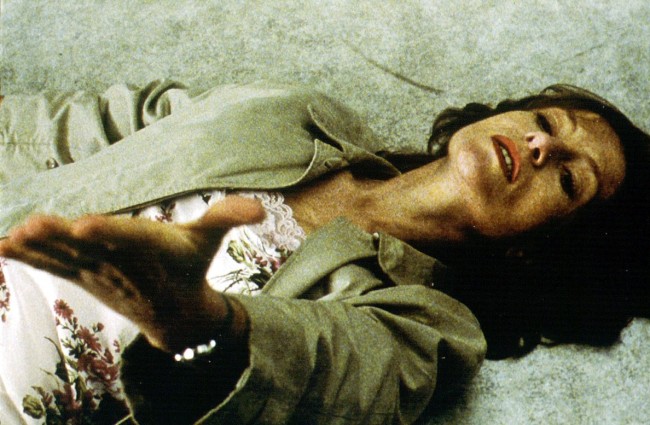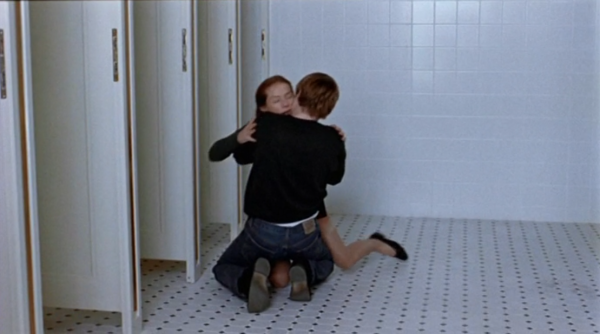By Mikhail Karadimov June 8th, 2015
It took me four hours to sit through Michael Haneke’s The Piano Teacher. And it’s only two-hours long. Every twenty minutes or so I’d feel the urge to step outside for a cigarette, or I would walk up and down the street and look at my neighbors’ homes, what their windows and rooms look like from the outside. I would scribble some notes, I would search for snacks. I did everything I could to keep away.
Needless to say, the film’s intense.
Isabelle Huppert plays the titular teacher. “Professor,” as everyone calls her. She’s a stringent lady who lives with her mother and dictates her life by the severity of her medium: music. It’s a bitch. Music, that is. It’s precise. It’s full of pressure and bullshit anxiety that can crush the daintiest of talents, like the butterfly on the wheel. Huppert’s Erika acts as one of the spokes in said wheel. She destroys her students with nonchalance. She doesn’t give a single fuck. Her students are less than her. They’re too goody-goody. Milquetoast. They’re not insane enough for the piano. Not according to her. Not if they want to master Schubert like she has. Because, as Erika puts it, Schubert is a man who wrote from the brink. His music communicates—as best as music can—what it means to be wrenched into the gutters of insanity. What it feels like to hold on one last time, to struggle, before giving in and cracking for good.
So it makes sense why her students—all well adjusted children—buckle under the tempestuous levels of tension. No one can handle perfection. Neither can Erika. But she tries. She tries as best she can. Even though all she wants is to lose control. Her extremist outlook, however, won’t allow for a breach of control. If she’s going to watch the rhythm and pace of other people’s metronomes, she must keep her shit together.
She’s been living above the din for most of her life. She doesn’t have sex because having sex means admitting to some truly perverse kinks. She’d have to explain the scars on her vagina, where she cuts herself with a loose razor in order to bleed down the side of her bathtub. She’d have to explain how she visits the local smut shop to use the private booths to watch porn and sniff used tissues. She rises above the primordial tangle of sex, she rises above the sensuality of it, the touch, and hovers like a senseless ghost. She doesn’t allow herself human warmth or intimacy. Other than her mother. But it’s not intimate in a healthy way. The two share the same bed and are always on top of each other for trifling matters. It’s not that long into the movie before we see Erika try and rip her mother’s hair from her scalp. These two get violent, they slap, they hiss, they demean and slice with their words. They think they’re better than everyone else and show it by dismissing any and every thought proposed to them. They have nothing but contempt for those who try to embroil them in menial conversation.
But Erika really does believe she’s above it all. As a person who’s slowly coming to terms with the other side of sanity, where it grows dark and lonely, but also illuminating (in its own way), Erika functions as if she can see all without anyone ever seeing her. She even visits a drive-in theater that shows porn on its big screen and walks alongside the parked cars looking for the perfect couple to eavesdrop on. She finds them, fucking, with their seats reclined. This turns Erika on. But not in the way most people would think. Instead of lingering with her gaze or touching herself, she hikes up her skirt, squats down, and pees. Right outside their door. This is how high and mighty Erika thinks she is. She looks at this live couple, this real couple, and watches them, uses them, as if they were just another porno.
This all changes once Erika meets a young virtuoso. Another pianist. A wunderkind of a kid. Beautifully blond, charismatic, and seemingly chivalrous. Walter Klemmer (Benoit Magimel). Klemmer watches the watcher. He’s infatuated with the watcher, so much so that he’s ready to remind her of the weight of gravity. He watches her at recitals as she plays, he watches her as she listens to others play. She turns around and there’s his gaze. At long last, she’s discovered a way to relinquish all control, but without losing any of it. (If that makes any sense).
Once their “love” has been consummated by Klemmer’s sudden appearance in the ladies bathroom—the most private of sanctities—Erika hands him a note with directions of how to have sex with her. They’re troubled directions. She wants to be beaten and chained and defiled, all while her mother sits helpless in the adjoining room. At first, Klemmer doesn’t give in. He tells her: “You are sick.” But then, after jerking off beneath her window, he comes back and gives Erika exactly what she wants. He owns her. Strikes her. Rapes her. But she asked him for it. She’s finally found a loophole to her unwavering discipline. She has no agency left, but it’s of her ultimate construct, so, in a way, she still has it all. It’s Klemmer who’s slave to Erika’s perversion.
This movie goes there, more so than any other Haneke film. I felt myself flinching, blanching at the sight of Huppert slicing herself, stabbing herself, getting rocked in the face, getting raped, exposing her body, her breasts, as blood trickled down her skin. At no point did anyone force me to watch the rest of the film, and yet, as a self-proclaimed cinephile, I always finish what I’ve started. It’s extremist, but that’s how I am. I watched of my own free will.
The closing shot, right after Erika stabs herself in the chest plate with a kitchen knife and storms off into the city night, is situated from across the street of where she teaches and holds recitals. A flat shot, directly across the street. As if the camera were an innocent bystander admiring the school and its façade. This is a favorite go-to shot for Haneke. He ends Cache (2005) the same way. Haneke’s loitering camera shows just how serene life can be when we don’t meddle, when we look from the outside and glory over the exterior of things.
I can’t help but recall the Bystander Effect.
Crowded street. People are out and about. It’s broad daylight. And someone gets stabbed, pummeled, abused. Openly. This person is a couple of stabs or kicks away from death while people watch from the sidelines. But no one moves. Everyone agrees tacitly: “This person needs help!” But no one does jack shit to follow through. They’re all paralyzed by lack of accountability, by transferring it onto others, onto everyone else around them.
And so here we are, across the street. We see what we see, but instead of intervening and cutting Erika’s tragic fate short by screaming at the projectionist to stop the reel, we scamper away with Haneke’s camera and deafen the intensity with distance. We try to step away from any guilt we may feel for having participated in Erika’s descent. Haneke knows where the threshold of our patience lies, our dread. Anything more psychotic than Erika stabbing herself due to jilted love would send us into a tizzy, back to our apartments, our holes, for serenity. This is the last step. This is where Erika gets off. Where she leaves this plane of sanity.
And we stand idly by as we watch her go.








